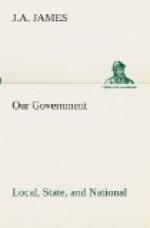This clause was attacked vigorously by the opponents of the Constitution, and especially in the Virginia and the North Carolina conventions. Said Patrick Henry: “And here I would make this inquiry of those worthy characters who composed a part of the late Federal Convention.... I have the highest veneration for those gentlemen; but, sir, give me leave to demand what right had they to say, ’We, the people’?... Who authorized them to speak the language of, We, the people, instead of, We, the States? If the States be not the agents of this compact, it must be one great, consolidated, national government of the people of all the States.” It was argued, on the other hand, by Randolph, Madison, and others, that the government, under the Articles of Confederation, was a failure, and that the only safe course to pursue was to have a government emanating from the people instead of from the States, if the union of the States and the preservation of the liberties of the people were to be preserved.
SUPPLEMENTARY QUESTIONS AND READINGS.
1. For an account of the members of the convention, see Hart, Contemporaries, III, 205-211.
2. For the contributions of the individuals and the classes of delegates, see Walker, The Making of the Nation, 23-27; Fiske, Critical Period, 224-229.
3. Discuss the peculiar conditions in Massachusetts. Give the arguments presented. Walker, 56-57; Fiske, Critical Period, 316-331.
4. How was the Constitution regarded in Virginia? Walker, 58, 60; Fiske, Critical Period, 334-338.
5. What was the attitude of the New York Convention toward the Constitution? Fiske, Critical Period, 340-345.
6. What objections were made against the Constitution in North Carolina? Hart, Contemporaries, III, 251-254.
7. What would have been the status of North Carolina and Rhode Island if they had not ratified? Walker, 73, 74; Hart, Formation of the Union, 132, 133.
8. Show the influence of the State constitutions on the Federal Constitution. James and Sanford, Government in State and Nation, 117.
9. For other questions on the material in this chapter, see Fiske, Civil Government, 211, 212; James and Sanford, Government in State and Nation, 135, 136, 137.
CHAPTER VII.
ORGANIZATION OF THE LEGISLATIVE DEPARTMENT.
ARTICLE I.
A Congress of Two Houses.—Section i. All legislative powers, herein granted, shall be vested in a Congress of the United States, which shall consist of a Senate and House of Representatives.
In the Constitutional Convention, the Pennsylvania delegates were the only ones who objected to the formation of a legislative body having two houses. It was believed that with two houses one would be a check upon the other, and that there would be less danger of hasty and oppressive legislation. Another reason for the formation of a congress having two houses was that the colonists were familiar with this kind of legislature. It existed in all of the States, Pennsylvania and Georgia excepted.




